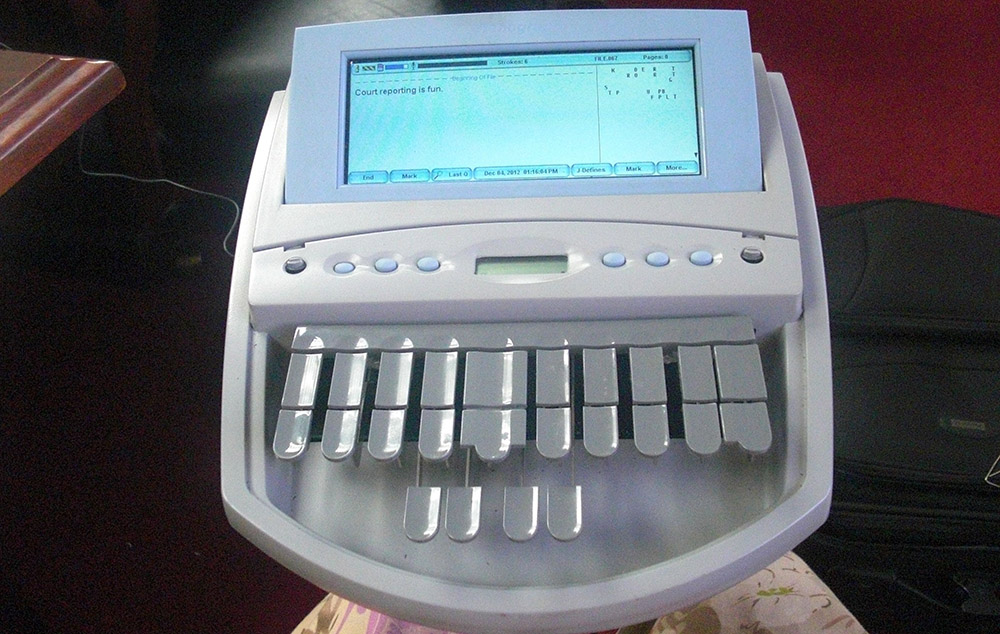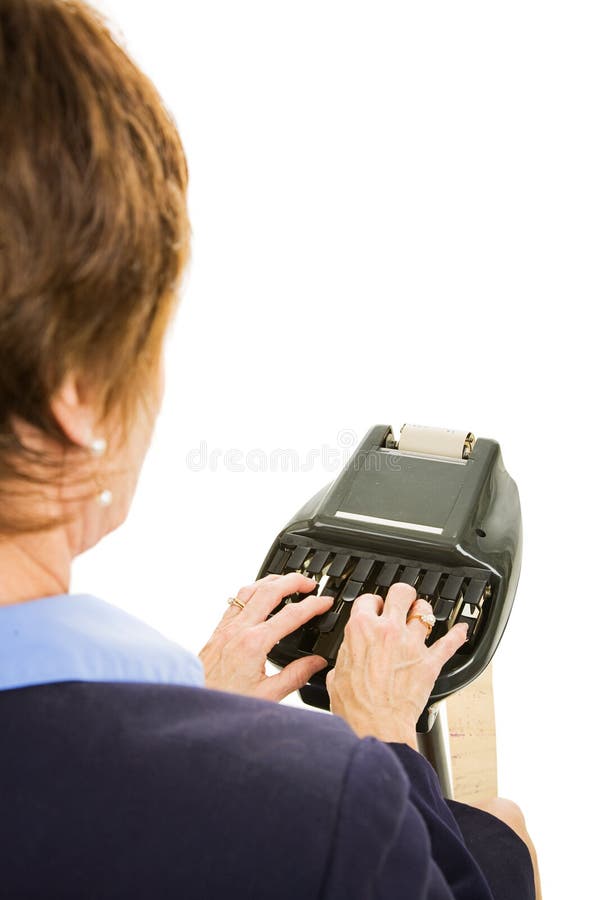Discover the Necessary Skills and Duties of a Court Typist in Today's Lawful Landscape
As a court typist, you hold an important position in the lawful system. Your abilities go past simply inputting; they entail comprehending complex legal terms and treatments while making certain precision in every document. You collaborate closely with lawyers and judges, making your role important for reliable interaction. Yet what certain abilities do you require, and how can you adapt to the ever-evolving technical landscape? Let's explore this further.
The Function of a Court Typist in the Judicial System
As the foundation of the judicial system, a court typist plays an important function in guaranteeing that lawful process are precisely documented. You are in charge of transcribing everything from witness statements to courts' rulings, recording every detail with precision. Your work helps keep a permanent and clear document of court activities, which is important for future referral and appeals.In the court, you're commonly the unsung hero, silently ensuring that all spoken words come to be composed documents. You maintain discretion, recognizing the delicate nature of legal matters. You also collaborate carefully with legal representatives, judges, and staffs to assure the smooth flow of info. By functioning efficiently under stress, you add to the general effectiveness of the judicial procedure. Your attention to detail and dedication to precision not only copyright the honesty of the court but additionally sustain the broader pursuit of justice in culture.
Essential Abilities Required for Court Typists
Court typists require an unique mix of abilities to excel in their crucial role within the judicial system. Firstly, you should have exceptional typing skills, frequently attaining rates of 70 words per minute or even more. Accuracy is essential; even a minor mistake can lead to considerable misunderstandings in legal files. You'll likewise need strong attention to detail, making sure every word is transcribed correctly.Additionally, good organizational abilities are important for taking care of numerous situations and documents successfully. Being tech-savvy is essential, as you'll utilize numerous software programs for data processing and record management. Strong interaction abilities assist you interact with judges, attorneys, and other court personnel effectively.Lastly, a feeling of professionalism and reliability and discretion is a must, as you'll manage sensitive details daily. By refining these skills, you'll be well-prepared to contribute significantly to the court setting.
Recognizing Lawful Terminology and Procedures
As a court typist, you need to understand crucial legal terms and procedures to perform your task properly. Recognizing these ideas not only aids you transcribe precisely yet also assures you can comply with the circulation of court procedures. Let's check out the vital legal vocabulary and a summary of court processes you must understand.

Secret Legal Terms
Recognizing vital lawful terms is crucial for any individual working in a courtroom setting. You'll regularly run into terms like "plaintiff," which describes the person launching a legal action, and "accused," who reacts to the accusations. Understanding the difference between "civil" and "criminal" instances assists you realize the context of the procedures. Familiarity with "subpoena" warranties you understand the lawful documents engaging witnesses to affirm. Additionally, terms like "proof" and "testament" are necessary, as they relate directly to the info provided in court. Grasping these terms not only enhances your performance as a court typist however also ensures that you add to the precision and clarity of legal records. Your function pivots on specific terminology, so don't take it lightly!
Court Procedures Introduction
Knowledge with crucial legal terms sets the stage for comprehending court procedures. Understanding just how a court features is essential for any court typist. You'll experience processes like arraignments, where accuseds listen to charges, and activities, which are ask for a court ruling. Familiarize yourself with the roles of courts, clerks, and attorneys, as each plays a critical part in procedures. Understanding the circulation of a trial-- from court selection to closing arguments-- helps you precisely capture the process - court typist. Furthermore, comprehending the significance of preserving a accurate and neutral document can't be overstated. By grasping these elements, you'll improve your performance in recording crucial court activities and contribute substantially to the legal process. Your duty is crucial in maintaining the honesty of court records
The Impact of Innovation on Court Keying In
Innovation's transformed court inputting in substantial ways. With electronic transcription devices, you can increase performance and accuracy, making your job much easier than ever. And also, remote court process have altered exactly how you approach your job, requiring flexibility to new styles and innovations.
Digital Transcription Devices
As electronic transcription devices remain to evolve, they're transforming the means court typists execute their obligations. These tools simplify the transcription procedure, permitting you to record spoken words accurately and efficiently. With voice recognition software, you can transcribe real-time proceedings, reducing manual input and minimizing errors.Moreover, cloud-based platforms enable easy access to papers, so you can function collaboratively with lawful teams and assure everybody's on the same page. Automated formatting attributes conserve you time on repetitive jobs, letting you concentrate on web content quality.Additionally, digital devices enhance security, securing delicate info via encrypted storage space and controlled access. By welcoming these modern technologies, you can improve your performance and preserve the high criteria required in the legal field.
Remote Court Process
The rise of remote court procedures has significantly changed the landscape for court typists. You currently count on innovation to catch and record real-time hearings from your office or home. Experience with video clip conferencing systems is essential, as you'll require to browse them effortlessly to ensure an accurate record. You'll also have to take care of audio quality, as background sound or connection issues can interrupt your work. Furthermore, remote proceedings require fast reasoning; you may need to make clear declarations or request repeats in real-time. Remaining organized and effective is crucial, as due dates find out this here continue to be limited. Welcoming these technical innovations not only enhances your abilities however likewise ensures you remain a very useful property in today's advancing lawful atmosphere.
Accuracy and Attention to Information in Transcription
Precision and interest to detail are crucial in transcription, particularly for court typists. court typist. When you're recording lawful process, every word matters. A single mistake can change the significance of a declaration, possibly impacting the result of a case. You need to listen thoroughly, assuring that you capture every subtlety and inflection in the speaker's voice.Your ability to catch typos and grammatical errors is important. You don't simply kind; you validate that the last document is an accurate representation of what was said in court. This needs a keen eye and a thorough understanding of legal terminology.Moreover, you'll require to be knowledgeable about different accents and talking designs, as courtrooms can host a selection of audio speakers. By refining your accuracy and attention to information, you'll preserve the integrity of legal papers and add substantially to the judicial procedure. Your persistance around really makes a difference

Time Administration and Organizational Abilities
While taking care of multiple jobs, reliable time monitoring and organizational abilities are important for court typists. You'll commonly manage different target dates, from recording court process to preparing legal files. Prioritizing your workload is necessary; recognize urgent tasks and tackle them initially to guarantee timely submissions.Organizational skills come right into play when you're sorting via case records, notes, and files. Keeping whatever nicely categorized not only saves time but additionally minimizes the risk of error. see here Utilizing tools like schedules, order of business, or specialized software application can assist you remain on track and handle your time effectively.Moreover, establishing specific objectives for each and every work session can increase your efficiency. Break larger jobs into smaller jobs to make them extra workable. By developing these abilities, you'll not just boost your efficiency but likewise contribute significantly to the smooth procedure of the lawful process, ensuring every little thing runs like clockwork.
Proceeding Education and Expert Development Opportunities
Purchasing your abilities doesn't stop with time monitoring and company. As a court typist, you'll find that proceeding education and learning and expert advancement are necessary to staying competitive in the legal field. Search for workshops or on the internet courses concentrating on sophisticated keying strategies, legal terms, and transcription software application. These can sharpen your skills and help you adapt to the most recent technologies.Networking is similarly important. Join specialist organizations like the National Court Reporters Organization (NCRA) or regional lawful associations. They frequently use sources, training sessions, and conferences that can improve your understanding and connect you with peers.Don' t ignore certification programs that can increase your reputation and marketability. Remaining updated with the latest patterns and best methods in legal documents will certainly improve your performance and precision, making you a very useful possession to any kind of legal group. Spend in your development, and you'll gain the rewards throughout your occupation.
Often Asked Concerns
What Is the Normal Income Array for a Court Typist?
A court typist's common income ranges from $30,000 to $55,000 each year, relying on experience and place. You may additionally discover chances for development with added abilities, resulting in increased pay in the legal area.

Are Court Typists Required to Have a Lawful Level?
Court typists don't need a legal level, but having one can be valuable. You'll often discover that solid inputting skills and knowledge of legal terminology are more vital for success in this function.
What Are the Job Hours for a Court Typist?

Exactly How Do Court Typists Make Sure Confidentiality in Their Work?
You assure discretion by securely managing sensitive records, utilizing encrypted software, and following rigorous procedures. You stay aware of privacy laws and only share info with licensed employees, preserving depend on in the judicial procedure.
Can Court Typists Job From Another Location or Freelance?
Yes, you can function from another location or freelance as a court straight from the source typist, particularly if you have trusted innovation and a secure atmosphere. Many legal specialists now accept remote job, supplying flexibility and possibilities for independent typists. As the backbone of the judicial system, a court typist plays a vital role in guaranteeing that lawful procedures are precisely recorded. As a court typist, you require to understand vital legal terms and treatments to perform your job effectively. Mastering these terms not just enhances your performance as a court typist yet also assures that you contribute to the accuracy and quality of legal documents. The surge of remote court process has actually considerably transformed the landscape for court typists. As a court typist, you'll find that continuing education and expert development are important to remaining affordable in the legal field.
Comments on “A Day in the Life of a Busy Court Typist”